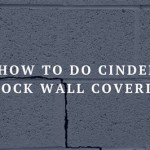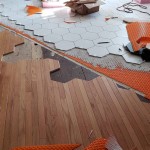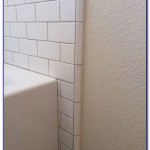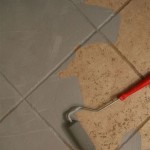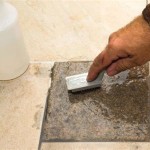How To Remove Hard Water Stains From Tile Floors In Showers
Hard water stains are a common nuisance in showers, particularly on tile floors. These unsightly deposits are the result of mineral-rich water evaporating and leaving behind a chalky residue. The minerals primarily responsible for hard water stains include calcium and magnesium. Over time, these minerals accumulate, forming a stubborn layer that detracts from the cleanliness and aesthetic appeal of the shower. Addressing these stains promptly and effectively is crucial for maintaining the hygiene and appearance of the bathroom.
Understanding the nature of hard water stains is the first step in devising a removal strategy. The composition of the stains dictates the types of cleaning agents and methods that will be most effective. While some commercial products are specifically formulated for this purpose, many readily available household solutions can also provide satisfactory results. The key is to choose the right approach based on the severity of the stains and the type of tile flooring.
The frequency with which hard water stains appear is directly related to the mineral content of the water supply. Homes serviced by well water or located in regions with naturally hard water are more susceptible to these issues. Additionally, factors such as inadequate ventilation in the shower area can exacerbate the problem, as moisture lingers and allows minerals to deposit more readily. Regular cleaning and proactive measures can help mitigate the buildup of hard water stains.
Safety precautions are paramount when undertaking any cleaning project. It is essential to wear appropriate protective gear, such as gloves and eye protection, to prevent skin irritation or chemical exposure. Ensure adequate ventilation by opening windows or using an exhaust fan. When combining cleaning agents, exercise extreme caution, as certain mixtures can produce hazardous fumes. Always test cleaning solutions on a small, inconspicuous area of the tile to ensure they do not cause discoloration or damage before applying them to the entire surface.
Identifying and Assessing Hard Water Stains
Before attempting to remove hard water stains, it is important to accurately identify them and assess their severity. Hard water stains typically appear as white or off-white deposits on the surface of the tile. They may be more pronounced in areas where water frequently pools or splashes, such as around the drain or along the shower walls. The texture of the stains can range from a light film to a thick, crusty buildup, depending on the duration and extent of the mineral accumulation.
Differentiating hard water stains from other types of stains, such as soap scum or mildew, is crucial for selecting the appropriate cleaning method. Soap scum is typically a greasy or waxy residue that is composed of soap and body oils. Mildew, on the other hand, is a type of fungus that thrives in damp environments and often appears as black or dark green spots. While some cleaning agents can effectively remove multiple types of stains, it is best to address each type of stain with a targeted approach for optimal results.
The type of tile flooring also influences the choice of cleaning method. Certain types of tiles, such as natural stone, are more porous and susceptible to damage from acidic or abrasive cleaners. Other types of tiles, such as ceramic or porcelain, are generally more durable and can withstand more aggressive cleaning techniques. Understanding the properties of the tile is essential to avoid causing irreversible damage.
Furthermore, the condition of the grout lines should be assessed. Grout is often more porous than tile and is more prone to staining and discoloration. Hard water stains can penetrate deep into the grout, making them more difficult to remove. Special attention should be given to cleaning and sealing the grout to prevent future staining.
Effective Cleaning Solutions
Several effective cleaning solutions can be used to remove hard water stains from tile floors in showers. These solutions range from readily available household products to specialized commercial cleaners. The choice of solution depends on the severity of the stains, the type of tile, and personal preferences.
Vinegar is a common and effective household cleaner for removing hard water stains. Its acidic properties help dissolve mineral deposits without causing damage to most types of tile. To use vinegar, mix equal parts white vinegar and water in a spray bottle. Spray the solution onto the affected areas and allow it to sit for 10-15 minutes. Then, scrub the tile with a stiff brush or sponge and rinse thoroughly with water. For stubborn stains, undiluted vinegar can be used, but it should be tested on a small area first to ensure it does not damage the tile or grout.
Baking soda is another versatile household cleaner that can be used to remove hard water stains. It is a mild abrasive that can help scrub away mineral deposits without scratching the tile. To use baking soda, make a paste by mixing it with a small amount of water. Apply the paste to the affected areas and let it sit for 10-15 minutes. Then, scrub the tile with a brush or sponge and rinse thoroughly with water. Baking soda can also be combined with vinegar to create a fizzing action that helps loosen and remove stubborn stains.
Lemon juice is a natural alternative to vinegar that can also be used to remove hard water stains. It contains citric acid, which has similar dissolving properties to acetic acid in vinegar. To use lemon juice, simply squeeze the juice of one or two lemons onto the affected areas and let it sit for 10-15 minutes. Then, scrub the tile with a brush or sponge and rinse thoroughly with water. Lemon juice has a pleasant scent and is a good option for those who are sensitive to the odor of vinegar.
Commercial hard water stain removers are specifically formulated to dissolve mineral deposits and remove stubborn stains. These products often contain stronger acids and detergents than household cleaners. When using commercial cleaners, it is important to follow the manufacturer's instructions carefully and wear appropriate protective gear. Test the cleaner on a small, inconspicuous area of the tile before applying it to the entire surface to ensure it does not cause discoloration or damage.
Preventative Measures and Maintenance
Preventing hard water stains is often easier and more effective than removing them after they have accumulated. Several preventative measures can be taken to minimize the buildup of mineral deposits on tile floors in showers.
The most effective way to prevent hard water stains is to install a water softener. Water softeners remove calcium and magnesium from the water supply, thereby reducing the concentration of minerals that cause hard water stains. While water softeners require an initial investment, they can save time and effort in the long run by preventing the buildup of mineral deposits on fixtures and appliances throughout the home.
After each shower, squeegeeing the tile floors and walls can help remove excess water and prevent mineral deposits from forming. A squeegee is a simple and inexpensive tool that can significantly reduce the buildup of hard water stains. It is important to squeegee the entire surface of the tile, including the grout lines, to ensure that all excess water is removed.
Improving ventilation in the shower area can also help prevent hard water stains. Adequate ventilation allows moisture to evaporate more quickly, reducing the amount of time that minerals have to deposit on the tile surface. This can be achieved by opening windows or using an exhaust fan during and after showering. Ensuring that the shower area is well-ventilated is particularly important in humid climates.
Regular cleaning with mild soap and water can help prevent the buildup of hard water stains. A simple solution of soap and water can remove light mineral deposits before they become stubborn. It is important to use a mild, non-abrasive soap to avoid damaging the tile or grout. Clean the tile floors and walls at least once a week to maintain their cleanliness and prevent the accumulation of hard water stains.
Sealing the grout lines can help prevent hard water stains from penetrating deep into the grout. Grout sealers create a barrier that repels water and minerals, making it easier to clean and maintain the grout. Apply a grout sealer every year or two, or as needed, to keep the grout looking its best. It is important to choose a grout sealer that is specifically designed for use in wet environments, such as showers.

Shower Cleaning Makeover Removing Limescale From Glass Door And Grout Tiles

How To Remove Hard Water Stains Chet S Cleaning

Stone Pro How To Remove Hard Water Spots In Showers

3 Best Ways To Get Rid Of Hard Water Stains From Bathroom Tiles Kent

Clean Hard Water Stains Tile Using White Vinegar Askthebuilder Com

How To Remove Hard Water Stains From Tiles Myhomeware Blog

How To Remove Hard Water Stains In Bathroom Tiles

5 Easy Methods To Remove Hard Water Stains In Shower

How To Remove Stains From Bathroom Tiles

Home Dzine Bathrooms Remove Hard Water Stains And Mould
Related Posts


